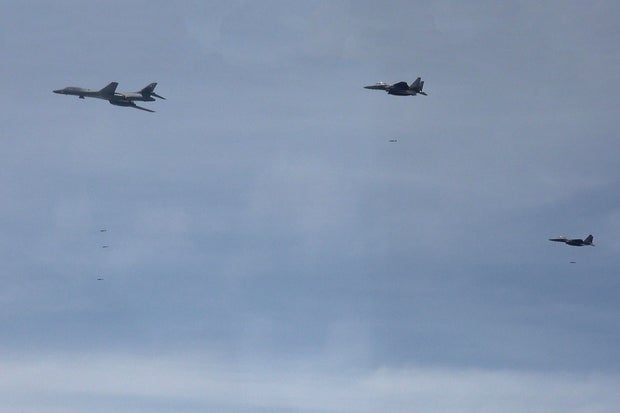CBS News
U.S. flies long-range B-1B bomber over Korean Peninsula for first precision bombing drill in 7 years

The United States flew a long-range B-1B bomber over the Korean Peninsula on Wednesday for its first precision-guided bombing drill with South Korea in seven years, the South said Wednesday.
The drill – seen as a show of force against North Korea – comes as tensions are rising over the North’s recent launches of trash-carrying balloons toward South Korea and other provocations.
Wednesday’s training involved other advanced U.S. and South Korean fighter jets as well as the B-1B aircraft, the second U.S. bomber temporarily deployed over the Korean Peninsula this year. The exercise was meant to demonstrate the U.S. security commitment to South Korea and strengthen the allies’ joint defense posture, according to the South Korean Defense Ministry, which posted images of the drill on social media.
During the training, the B-1B dropped Joint Direct Attack Munitions while being escorted by South Korean jets, the first such bombing drill for a U.S. bomber since 2017, a ministry statement said.
/ AP
It said South Korean fighter jets also conducted live-firing exercises to demonstrate the country’s readiness to punish North Korea if provoked, it said.
The JDAM bombs include “bunker-busters.” JDAM is a guidance system that converts unguided, conventional bombs into more precise, GPS-guided weapons. All U.S. fighter jets, bombers and drones can use JDAMs, and the munitions are among the weapons systems the United States has been providing to Ukraine to help it fight Russia’s invasion.
North Korea is extremely sensitive to drills using bunker-buster bombs, which could threaten its leadership and complex web of underground military tunnels and structures. North Korea has previously responded to the flights of powerful U.S. aircraft in South Korea with its own missile tests.
A B-1B is capable of carrying a large conventional weapons payload. North Korean has previously called the bomber’s deployment proof of U.S. hostility.
Last month, the South Korean Defense Ministry released an image of a U.S. Marine Corps F-35B stealth fighter executing a maneuver over Kunsan Air Force Base during a joint exercise.
“The exercise bolstered our confidence to decisively overcome any adversary with an overwhelming response to provocations,” ROK AF F-35A pilot Major Kim Seong-jun said in a statement at the time.
In the past week, North Korea floated hundreds of huge balloons to drop manure, cigarette butts, scraps of cloth and waste batteries across South Korea. In response, South Korea vowed “unbearable” retaliatory steps and suspended a fragile tension-reducing military deal with North Korea, restoring its front-line military activities.
The suspension of the 2018 inter-Korean deal allows South Korea to resume live-fire drills or anti-North Korean propaganda broadcasts via loudspeakers in border areas. Such steps will likely prompt North Korea to take provocative steps in response.
Recently, North Korea launched a rocket in an attempt to place a second spy satellite into orbit in violation of U.N. resolutions, but it blew up shortly after liftoff. It also test-fired nuclear-capable weapons for a drill simulating a pre-emptive strike on South Korea, and allegedly jammed GPS navigation signals in South Korea.
North Korea sent its first military reconnaissance satellite into orbit in November last year as part of efforts to build a space-based surveillance network to cope with what it calls increasing U.S.-led military threats. North Korean leader Kim Jong Un later told a ruling party meeting that the country would launch three additional military spy satellites in 2024.
CBS News
Four arrested in insurance fraud plot with bizarre twist

Watch CBS News
Be the first to know
Get browser notifications for breaking news, live events, and exclusive reporting.
CBS News
Eye Opener: Dangerous smog chokes India, Pakistan

Watch CBS News
Be the first to know
Get browser notifications for breaking news, live events, and exclusive reporting.
CBS News
Ukraine’s Zelenskyy says he wants to end war with Russia through diplomacy next year

Ukrainian President Volodymyr Zelenskyy said Kyiv would like to end the war with Russia next year through “diplomatic means” as both countries prepare for President-elect Donald Trump’s return to the White House.
In an interview with the Ukrainian media outlet Suspilne, Zelenskyy said he is certain that the war will end “sooner” than it otherwise would have once Mr. Trump becomes president.
“It is certain that the war will end sooner with the policies of the team that will now lead the White House. This is their approach, their promise to their citizens,” Zelenskyy said.
The prospect of Trump returning to power in the United States next year has raised questions about the future of the conflict, as the Republican has been critical of U.S. military aid to Kyiv.
Zelenskyy said that Ukraine “must do everything so that this war ends next year, ends through diplomatic means.”
February 2025 would mark the third year of Moscow’s invasion of Ukraine with Russia’s troops gaining ground in recent months.
There have been no meaningful talks between Russia and Ukraine. Still, Mr. Trump’s re-election has plunged the conflict’s future into uncertainty, with the Republican president-elect repeatedly promising to cut a quick deal to end the war.
“We have to understand what the Russians want,” Zelenskyy said.
Russian President Vladimir Putin has said he will only accept talks with Ukraine if Kyiv surrenders Ukrainian territory that Moscow occupies. Zelenskyy has rejected Putin’s conditions.








